UN DESA | DPAD | Development Policy Analysis Division
** This page has moved permanently. If you are not redirected please click here: https://www.un.org/development/desa/dpad/document_gem/development-issues-series/ **
Development Issues Series
2015
No. 1: Concepts of Inequality
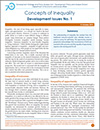
The understanding of inequality has evolved from the traditional outcome-oriented view, whereby income is used as a proxy for well-being. The opportunity-oriented perspective acknowledges that circumstances of birth are essential to life outcomes and that equality of opportunity requires a fair starting point for all.
No. 2: Inequality Measurement

There are many measures of inequality that, when combined, provide nuance and depth to our understanding of how income is distributed. Choosing which measure to use requires understanding the strengths and weaknesses of each, and how they can complement each other to provide a complete picture.
No. 3: Multidimensional Poverty
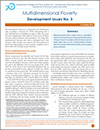
Measuring poverty with a single income or expenditure measure is an imperfect way to understand the deprivations of the poor since, for example, markets for basic needs and public goods may not exist. Complementing monetary with non-monetary information provides a more complete picture of poverty.
No. 4: Inequality and the 2030 Agenda for Sustainable Development
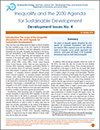
The subject of inequality appears throughout the 2030 Agenda for Sustainable Development, both directly and indirectly. When examined across the four different angles of inequality—access, gender, opportunity and outcomes—many goals and targets of the Sustainable Development Goals are clearly linked to inequality.
No. 5: Income convergence or persistent inequalities among countries?
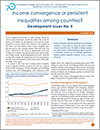
Income convergence between developed and developing countries in recent years is mainly the result of rapid economic growth in Asia. The distance between average per capita income in other developing regions and that in developed countries has not changed significantly; between-country inequality continues to be a cause of concern.
2017
No. 6: What does the analysis of WESS 2016 suggest for the ESCWA region? climate change and inequalities
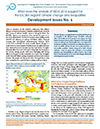
Income convergence between developed and developing countries in recent years is mainly the result of rapid economic growth in Asia. The distance between average per capita income in other developing regions and that in developed countries has not changed significantly; between-country inequality continues to be a cause of concern.